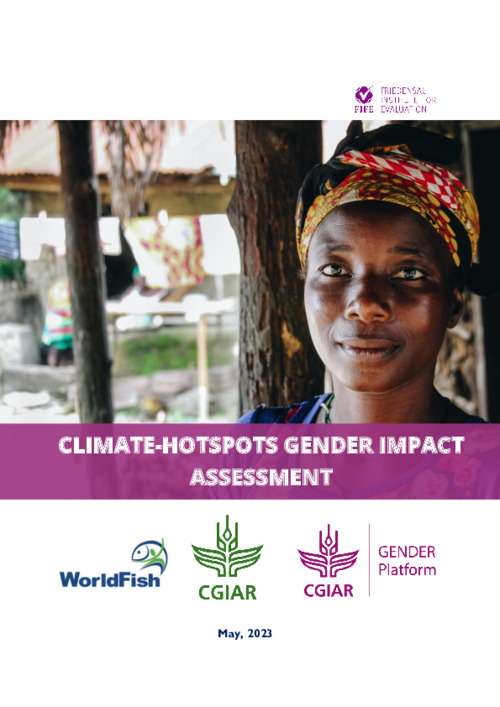Please use this identifier to cite or link to this item:
https://hdl.handle.net/20.500.12348/5565
Climate-hotspots Gender Impact Assessment Report
| dc.creator | Mudege, N. | en_US |
| dc.creator | Kwaku, A. | en_US |
| dc.creator | Manyise, T. | en_US |
| dc.creator | Kakwasha, K. | en_US |
| dc.creator | Kihoro, E. | en_US |
| dc.creator | Lecoutere, E. | en_US |
| dc.date.accessioned | 2023-07-09T17:12:29Z | |
| dc.date.available | 2023-07-09T17:12:29Z | |
| dc.date.issued | 2023 | en_US |
| dc.identifier.citation | Netsayi Mudege, Arhin-Sam Kwaku, Timothy Manyise, Keagan Kakwasha, Esther Kihoro, Els Lecoutere. (30/5/2023). Climate-hotspots Gender Impact Assessment Report. Bayan Lepas, Malaysia: WorldFish (WF). | en_US |
| dc.identifier.uri | https://hdl.handle.net/20.500.12348/5565 | |
| dc.description.abstract | Specifically, the study assessed 1) the effect of WorldFish interventions on gender-equal access and control over resources, technology, and information among smallholder farmers, including productivity, and food security, 2) the effect of WorldFish projects on climate resilience among smallholder fish farmers, and 3) the impact of WorldFish projects on gender equality and women’s empowerment in aquaculture. To achieve the third (impact) objective, the evaluation tested the hypotheses that the two WorldFish projects have 1) enhanced involvement of women in aquaculture, 2) enhanced gender equality in access and control over resources, technology and/or information on aquaculture, 3) enhanced gender equality in climate resilient practices (knowledge and adoption of CSA aquaculture practices), 4) enhanced women’s empowerment, and 5) enhanced gender equality in terms of benefits from the food system. The study compared results from fish farmers in districts where the WordFish projects were implemented (treatment districts) with fish farmers in districts without WorldFish projects (control districts). Also, it included small and medium size business owners supported in the treatment districts through WorldFish interventions (called hatchery and feed operators). | en_US |
| dc.format | en_US | |
| dc.language | en | en_US |
| dc.publisher | WorldFish (WF) | en_US |
| dc.rights | CC-BY-NC-4.0 | en_US |
| dc.subject | climate adaptation and mitigation | en_US |
| dc.title | Climate-hotspots Gender Impact Assessment Report | en_US |
| dc.type | Internal Report | en_US |
| cg.contributor.funder | CGIAR Gender Platform | en_US |
| cg.contributor.project | GENDER Platform 2021 (Zambia) | en_US |
| cg.coverage.country | Zambia | en_US |
| cg.coverage.region | Eastern Africa | en_US |
| cg.subject.agrovoc | aquaculture | en_US |
| cg.subject.agrovoc | fisheries | en_US |
| cg.subject.agrovoc | gender | en_US |
| cg.subject.agrovoc | climate resilience | en_US |
| cg.subject.agrovoc | fish | en_US |
| cg.contributor.affiliation | WorldFish | en_US |
| cg.contributor.affiliation | CGIAR Gender Platform | en_US |
| cg.contributor.affiliation | The Friedensau Institute for Evaluation | en_US |
| cg.identifier.status | Open access | en_US |
| cg.contribution.worldfishauthor | Mudege, N. | en_US |
| cg.contribution.worldfishauthor | Manyise, T. | en_US |
| cg.contribution.worldfishauthor | Kakwasha, K. | en_US |
| cg.description.theme | Gender | en_US |
| cg.description.theme | Climate Change | en_US |
| cg.creator.id | Netsayi Mudege: 0000-0002-0389-1967 | en_US |
| cg.creator.id | Timothy Manyise: 0000-0003-1951-9892 | en_US |
| cg.creator.id | Keagan Kakwasha: 0000-0002-8646-9154 | en_US |
| cg.subject.sdg | SDG 1 - No poverty | en_US |
| cg.subject.sdg | SDG 2 - Zero hunger | en_US |
| cg.subject.sdg | SDG 13 - Climate action | en_US |
| cg.subject.actionArea | Resilient Agrifood Systems | en_US |
| cg.subject.impactArea | Climate adaptation and mitigation | en_US |
| cg.subject.impactArea | Gender equality, youth and social inclusion | en_US |
| cg.contributor.initiative | Aquatic Foods | en_US |
Files in this item
This item appears in the following Collection(s)
-
Climate Change [204]
-
Gender [323]
